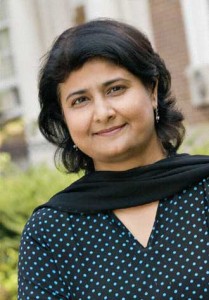
Much is known about the challenges to evolution education we’ve seen in North America, largely centered around Christian creationism, but we know very little about how Muslim students and their families may react to the teaching of evolution in science classes. The $250,000 Islam and Evolution research project has been examining how Muslims relate to the central concept of biology, and to science in general, at McGill’s Evolution Education Research Center since 2005. The core study team comprises McGill’s Dr. Brian Alters (project PI), Dr. Anila Asghar of Johns Hopkins University, and Dr. Jason Wiles of Syracuse and McGill universities. On March 30 and 31, the project team will share key findings during the McGill Symposium on Islam and Evolution at the Redpath Museum Auditorium. Before the Symposium, the McGill Reporter asked Dr. Asghar, an Assistant Professor at Johns Hopkins’ School of Education, four burning questions about Islam and evolution.
1. Q: Is Islam at odds with evolutionary biology?
A: There doesn’t appear to be only one “Muslim position” on evolution. The intellectual and popular responses to evolution reflect a wide spectrum of views ranging from complete rejection to all-embracing acceptance of evolution. While many Muslims do reject evolutionary theory, several are able to reconcile science with their religious beliefs. For example, one of our panelists is Ehab Abouheif, a McGill professor and Canada Research Chair in Evolutionary Developmental Biology. According to Dr. Abouheif, “…my daily scientific activities of performing evolution-centered research do not conflict with my daily spiritual activities as a Muslim…I strongly believe one can practice evolutionary biology without compromising one’s faith as a Muslim.”
2. Q: Do scientists in Islamic countries accept evolution?
A: Apparently so. The Scientific Academies of several Muslim countries (Egypt, Pakistan, Morocco, Palestine, Iran, Indonesia, and Turkey) recently signed onto a statement proclaiming that evolution is an “evidence based fact” which has never been contradicted by scientific evidence. Nevertheless, Muslim scientists tend to reconcile evolutionary theory to their religious beliefs in divergent ways. Our symposium will provide an excellent forum for further conversation. Drs. Taner Edis, Salman Hameed, Minoo Derayey, Uner Turgay, and Saouma BouJaoude will elaborate on the historical and contemporary response to, and the current status of, evolutionary thought among Muslim scholars.
3. Q: Is Islamic creationism the same as the Judeo-Christian-based creationism we see in the West?
A: There are certainly similarities, and indeed American creationist materials are often used by Muslim anti-evolution activists. But there are important differences as well. For example, Muslim creationists usually don’t insist that the Earth is only 6,000 years old as many Young Earth Creationists in North America claim. During the symposium, Josh Rosenau from the U.S. National Center for Science Education will offer a comparison of some popular Islamic creationist materials to those of Western anti-evolutionists.
4. Q: What is taught about evolution in the schools of Islamic countries?
A: Evolution is often part of the science curriculum and represented in the high school textbooks of Muslim nations. We’ve done approximately three years worth of research on such questions, and symposium participants will be reporting on not only the curricula used, but also on the ideas and attitudes toward evolution and the teaching of evolutionary theory held by Muslim students, teachers, and university professors from several Islamic countries and cultures (like Canada, Egypt, Indonesia, Lebanon, Pakistan and Turkey).
